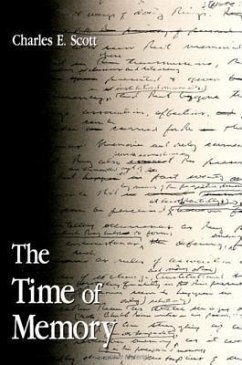The Time of Memory places emphasis on nonvoluntary memory and the mythology of memory in the context of questions that are prominent in contemporary thought. How do memories form experiences of origin and identity? How might we describe the functions of memory in thought or knowledge? Are there memories without images? How do past times become present? The book also addresses the force of mutation in the formation of memories as well as the roles of memories in experiences of ecstasy, sublimity, continuity, and discontinuity. The book engages Aristotle, Nietzsche, Foucault, Derrida, and Heidegger, as well as such mythological figures as Mnemosyne, Lethe, Dionysus, and Apollo.
Hinweis: Dieser Artikel kann nur an eine deutsche Lieferadresse ausgeliefert werden.
Hinweis: Dieser Artikel kann nur an eine deutsche Lieferadresse ausgeliefert werden.








